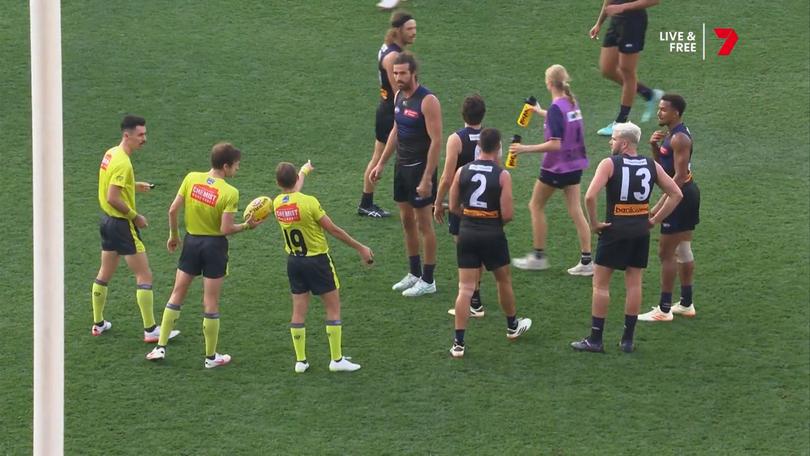Caitlin Bassett: Learning how to deal with bad calls is an integral part of the game
During my career, your attitude and how you react when things don’t go your way was so important that we practised game simulations with umpires who would purposely make bad calls to build our resilience.

As a professional athlete, there are not a lot of things you can control. How you look, how you train, how you eat is all dictated, but there is one thing you always have full control over — your attitude.
This can often be the difference between winning or losing, as we saw with the controversial dissent free kick that cost Fremantle their game against Carlton at the weekend.
During my career as a netballer, your attitude and how you react when things don’t go your way was so important that we actually practised game simulations with umpires who would purposely make bad calls to build our resilience come matchday.
Sign up to The Nightly's newsletters.
Get the first look at the digital newspaper, curated daily stories and breaking headlines delivered to your inbox.
By continuing you agree to our Terms and Privacy Policy.We often focus on the physical side of training and gloss over the importance of mental skills. Just like building strength in the gym, the ability to develop a strong mental game takes practice.
Our attitude is ultimately in our control and thankfully discipline is a learnt skill that simply needs practice to master.

So why not practice maintaining a cool head at training?
It was something we would do at national camps with the Diamonds in the lead up to international competitions where we knew we would have lower ranked umpires.
Our game plan relied on speed of ball and movement, which becomes stagnant when an umpire starts blowing their whistle.
In match play simulations at training, our umpires would be instructed to deliberately make wrong calls and it was our job as players to not react or let it distract us from our job.
While it was super frustrating, it became clear just how reactive I was to every call I thought was “wrong.”
Reacting verbally or with poor body language sometimes happens subconsciously – we don’t realise we are swearing under our breath, making a face or our dropping our head when things don’t go our way.
For me, it was an unwanted distraction that took me away from what I needed to be concentrating on.
Umpires are humans and just like players are bound to make mistakes. In a team sport the best allies you have are your teammates.
Catching a fellow player’s eye, running in for a high five or yelling out some positive reinforcement can all help to bring back focus.
In a game where it’s the opposition job to get under your skin, being able to ignore their attempts and perform regardless is such an under valued strength.
I can only hope in the preparation for this weeks game, Fremantle did some scrimmage where they deliberately set up some questionable umpiring calls to let players practice their discipline.

Whether you believe they were robbed or not in the last three minutes against the Blues, they get a chance this week to prove what they have learned when they face Port Adelaide.
Jordan Clark has become the poster boy for what not to do when frustrated, but what can the Dockers (and other teams) learn from this example?
A smart opposition will be switched on to exploiting him in particular as a weakness, brainstorming ways they can get him riled up again.
Staying in control when the pressure is on could be the difference between winning and losing.
